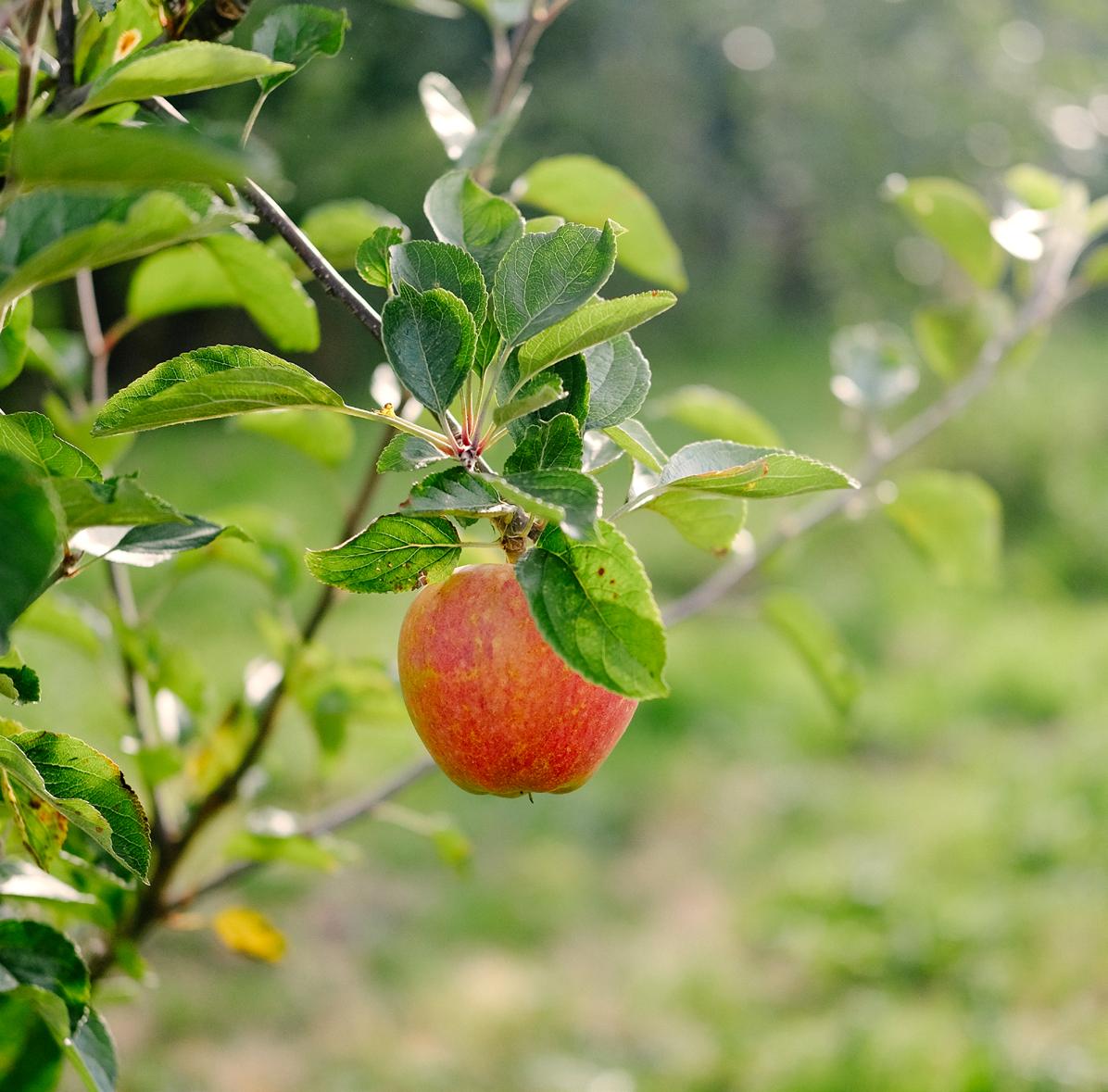

The Regeneration Fund
Final Report
June 2022 – June 2025


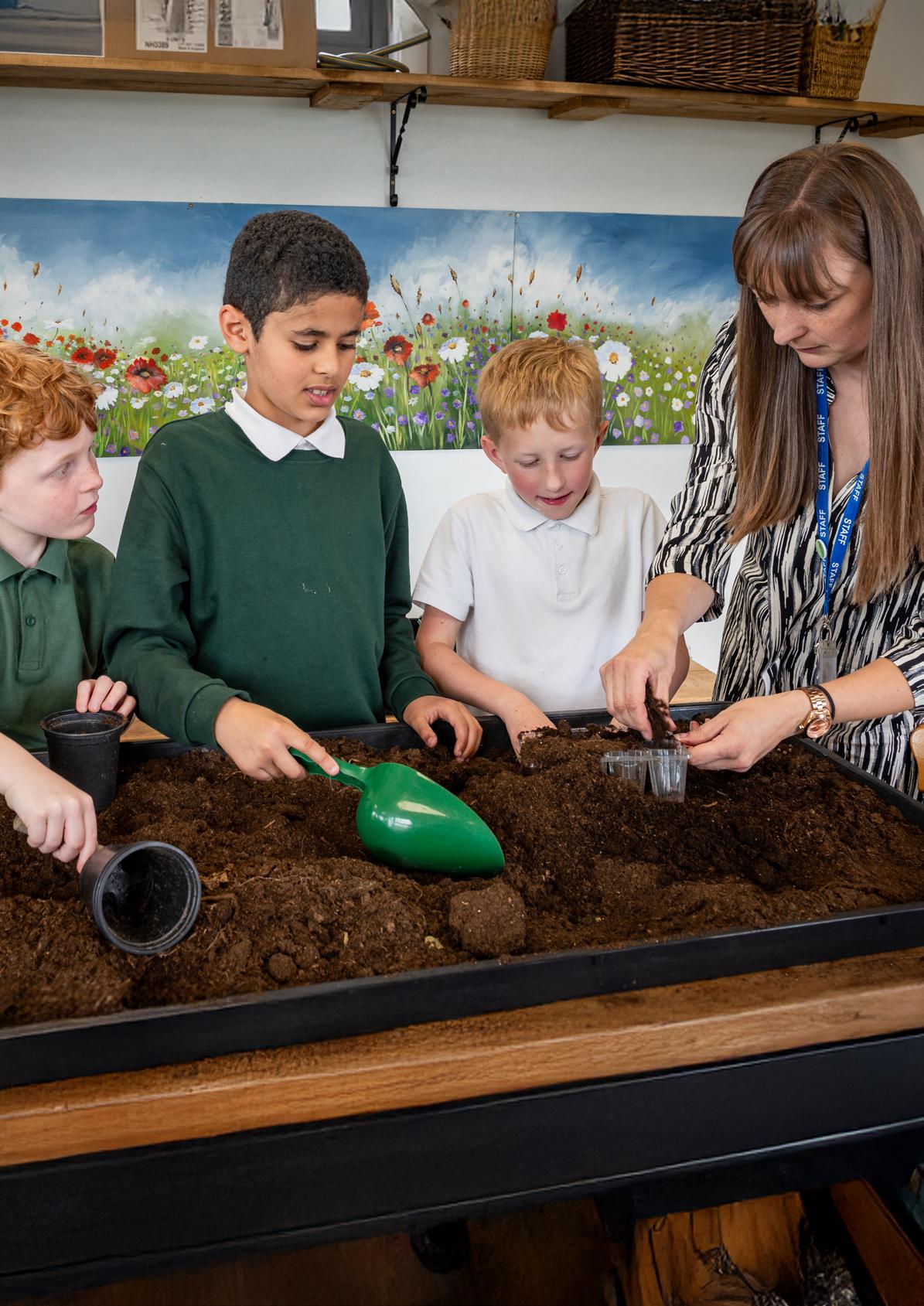
Picture: Pupils potting / Alfreton Park School
Farmer Led Tree Revolution
Over the course of the Regeneration Fund, agroforestryintegrating trees into the farmed landscape - has shifted from a fringe concept to a mainstream topic, with discussion now focused on how best to implement it across different landscapes and goals. Our role has been to support farmers to understand the environmental and economic benefits, build networks, offer advice and help farmers access funding.
Since 2022, we have exceeded our goal of establishing and maintaining six learning networks and now have ten active networks supporting 316 farmers. These networks are essential because we know that the uptake of practices most often occurs when farmers can see and discuss existing examples, opportunities and challenges as a group. The networks host farm walks to showcase good practice, and members receive regular tailored newsletters sharing events and case studies. Many members also join network WhatsApp groups to further connect with others.
We co-hosted the UK’s first-ever Agroforestry Show with the Woodland Trust in September 2023 and are preparing for a second in September 2025. The first Show marked a turning point for agroforestry in the UK, bringing the conversation from the fringes of progressive farming into the mainstream. Organic livestock farmer George Young, who started implementing agroforestry nearly five years ago and has since become an Agroforestry Ambassador with the Soil Association, said:

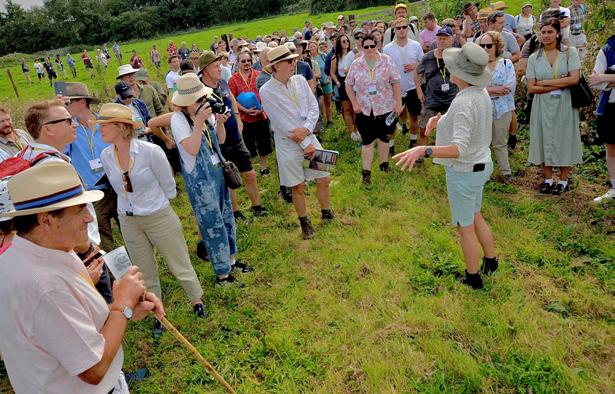
“The show has been fantastic. The big thing for me was just how many practical opportunities there were for planting trees and so many different ideas. I think we’re going to see a big upsurge of different planting styles in the next few years… It genuinely feels like the beginning of proper change.”
George is one of five ambassadors appointed over the past three years; these ambassadors create online content, host

Picture: Helen Browning, Agroforestry Show / Pete Williams
farm visits, and speak at farming events nationwide. Our team and partners also speak at events and webinars, including the Oxford Real Farming Conference and Groundswell, reaching nearly 1,600 individuals over the past year. Another ambassador, Andy Dibben, co-authored ‘Silvohorticulture: A Grower's Guide to Integrating Trees Into Crops’ with Ben Raskin, our Head of Agroforestry.
Our farm walks remain a key tool for demonstrating working systems and facilitating peer learning with ambassadors, network members, and Soil Association experts. Feedback has been consistently positive, with attendees valuing the chance to “pick brains” and expressing excitement about implementing their own plans. We also ran a new training programme 'Farming for Foresters’ for the Institute of Chartered Foresters, attracting over 60 participants. The high demand for the training demonstrates the strategic importance of programmes spanning the farming, forestry, and horticulture sectors. The Soil Association is rare in having expertise in all three sectors and so is uniquely placed to champion agroforestry.
We continue to provide free, practical, 1-2-1 agroforestry advice to farmers via calls, emails and farm visits. In 2024-25, we provided tailored advice to 75 farmers, covering topics such as
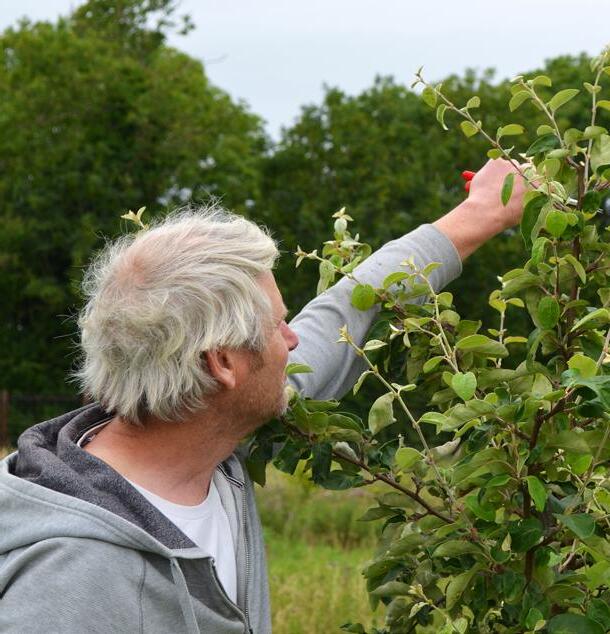
planting plans and tree propagation. To broaden access, we’ve built a rich online knowledge library, which is continuously updated and includes webpages, films, case studies, and an e-learning course. In the last year, over 830 people downloaded our Agroforestry Handbook, 42 individuals enrolled in e-learning, and our Agroforestry UK Facebook group now includes 2,400 members. Since we released the handbook in 2019, it has been downloaded more than 6,000 times and around 2,500 hard copies have been distributed.
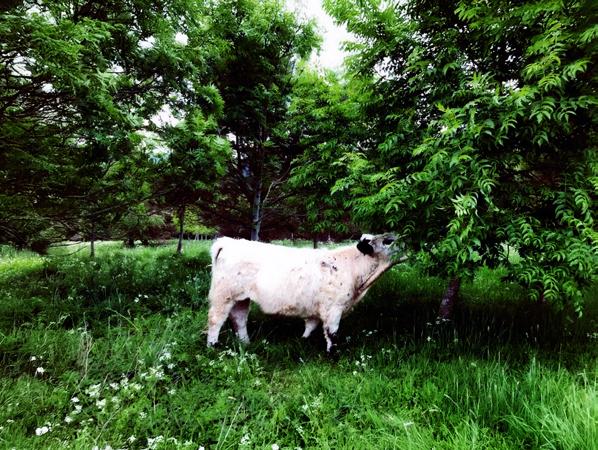
A key strand of our work has been helping farmers understand and access the financial benefits of agroforestry, both through diversified income streams and public funding. Our policy team has worked to ensure agroforestry is better supported in national funding frameworks. At events such as Groundswell, we ran sessions to help farmers navigate funding opportunities, including making the business case for agroforestry and identifying grants aligned with Whole Farm Tree Plans.



Innovative Farmers
When Innovative Farmers (IF) launched in 2012, on-farm trials (’field labs’) were not well understood. Farmers who wished to explore new nature-friendly techniques did not have access to a service that could lighten the risk of experimentation, offer technical support, or share their learnings.
Since then, we have launched 170 field labs and IF has changed the face of agricultural research, supporting innovation tailored to farmers’ needs. We regularly share updates on the labs’ progress and findings, as well as hosting farm walks and webinars to connect farmers and growers and exchange information. Since 2022, we have launched 37 labs, with an average of 5 farms directly running trials for each lab. In this period, we have reached around 10,000 farmers, researchers and policymakers through events, newsletters and online media. In the year from April 2024, we launched 14 new field labs, 1,700+ people attended an IF event, and we have 5,500+ subscribers to our newsletter. Overall coverage in the farming media nearly doubled year-on-year with a reach of 6.7M.
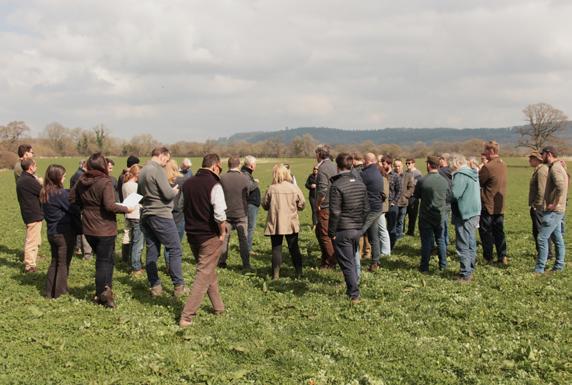
A December 2023 survey of triallists reflects anecdotal evidence that IF is driving practical change: 90% of triallists said IF had improved their confidence in experimenting on their farm; 100% reported useful networking opportunities; 100% said it improved their understanding of practices trialled; and 80% said it improved their skills in on-farm data collection.
As a charity, we seek to innovate solutions for the world to take on and IF has become a shining example of this. In 2024, following our proof of concept and referencing IF, Defra announced its new ADOPT fund, with the purpose of supporting “collaborative farmer-led, on-farm trials…[of] innovative solutions to farming challenges.” ADOPT will accelerate and scale on-farm experimentation and we are delighted to be a delivery partner. IF will continue to deliver an important and additional service to the ADOPT Fund; we will support farmers who are new to on-farm innovation and may struggle to access ADOPT funding, and we are operating across the UK, whereas ADOPT funds exclusively in England.
Once labs end, findings are freely and widely shared and triallists remain part of our network; many speak at farming events (e.g., Groundswell) or continue to run farm walks. Our 2023 triallist survey found that found that:
74% go on to speak with other farmers about the practice(s) they trialled
32% spoke about the field lab at events
87% continue with the trialled practices or intend to do so
65% ran further trials



Soil Association Exchange
Soil Association Exchange, developed by our charity and now an independent start-up under our Group, works with over 2,000 farms, stretching from Land’s End to Orkney.
Exchange measures farms’ footprints across six impact areas - biodiversity, soils, animal welfare, carbon, water, social –and then offers tailored advice on how to improve and access financial incentives. As of 2024, farmers on the platform are able to use our Dynamic Benchmarking tool to access real-time insights into farm performance across 40 key metrics, including carbon emissions, bird species abundance, plant diversity and soil organic matter. For the first time, farmers can see how they score in each metric compared to hundreds of other farms. We have also launched a Sustainable Farming Incentive management feature and the ability for farmers to add data directly from the field, using the app.
This year, Exchange launched Exchange Market – an innovative funding scheme, created in collaboration with farmers, that rewards them for reducing their emissions. The Market already has £1m in funding from businesses with shared supply chains who are keen to reduce their Scope 3 emissions. Rather than involving the sale of carbon credits (off-setting), the Market will operate as an in-setting fund, allowing farmers to maintain autonomy over how they reduce emissions and meaning that businesses are reducing emissions within their supply chains rather than off-setting them elsewhere. Farmers who engage with the Market will receive half of their payments upfront to give them greater financial flexibility to implement further improvements on-farm.
Exchange seeks to empower farmers to transition to nature-friendly practices while building their financial resilience and our ongoing customer feedback finds that:
92% of farmers changed to more nature-friendly practices after working with Exchange
78% said it has made their business more profitable
92% would recommend the service to other farmers
Exchange Market has been created in collaboration with farmers from the start. The result is a fund that offers the flexibility we need to do the right thing for our farm, and provide the financial support for us to try new ways to reduce our emissions. As subsidy funding changes in the UK, schemes like Exchange Market give our business further resilience by offering new income streams from private markets.
James Hay, Barton Place Farms, member of the farmer steering group
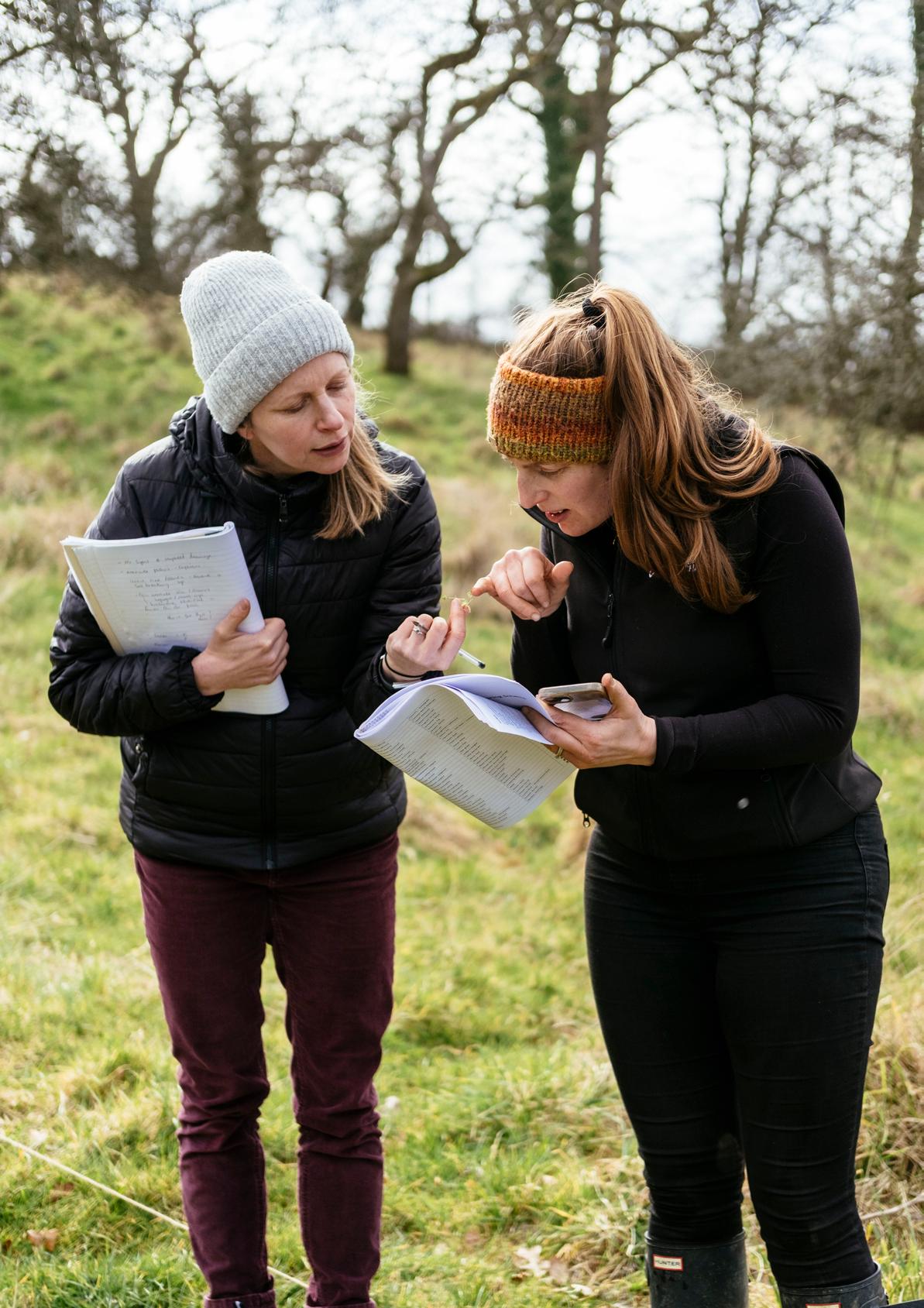



Scottish Food Leadership
In Scotland, 114,702 Food for Life Served Here (FFLSH) certified school meals are served each day, guaranteeing those children at least one fresh, locally sourced and sustainable daily meal.
Soil Association Scotland’s Food for Life Scotland (FFLS) programme, funded by Scottish Government, supports public sector settings to achieve the FFLSH certification for their catering services. In addition to schools, FFLS has expanded over the last two years into new areas of the public sector, including universities and care homes. We were delighted that two West Dunbartonshire Council care homes became the first care settings in Scotland to achieve FFLSH Bronze in early 2025. FFLSH is a fantastic framework through which Scotland’s caterers can make a difference by providing food that’s better for climate, nature and health,
while also supporting the local economy. Scotland’s proposed national Good Food Nation Plan lists FFLSH as an indicator of progress towards one of the six outcomes listed in the Plan.
Beyond our core FFLS work, we have run multiple pilots over the past few years in Scotland, including the ‘Give Peas a Chance!’ pilot (2024-25), which has opened a new route to market for local, organic, nutritious and climatefriendly green split peas, and was named the Best Local Initiative Championing Children's Healthy Food at the Children's Food Awards 2025. The pilot included
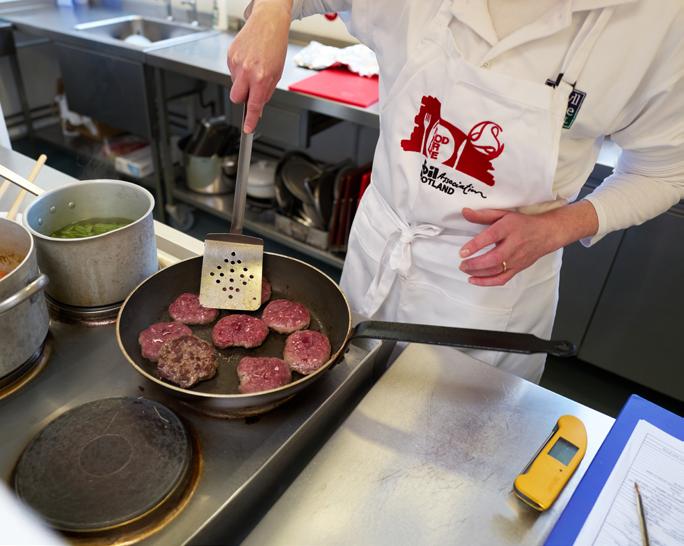
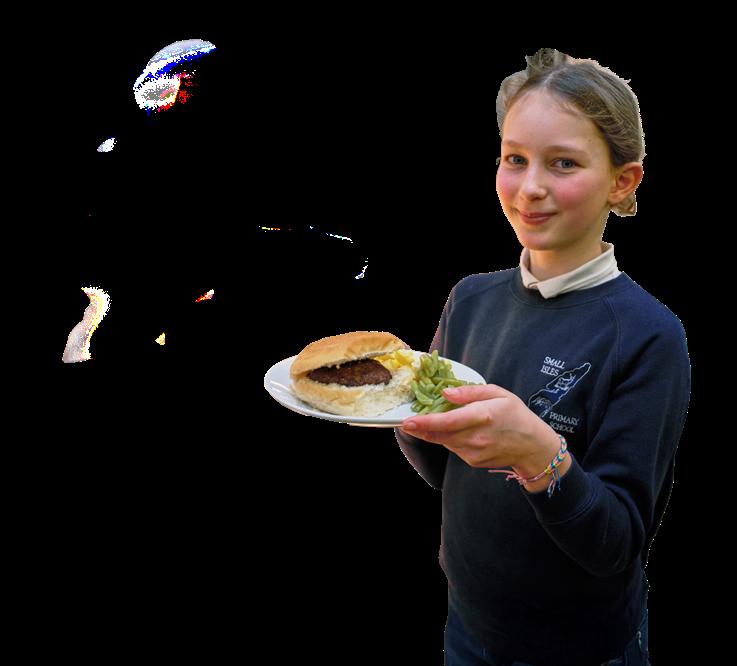
Pictures: Wild Jura pilot / Maker Limited, Pupil with venison burger / Maker Limited
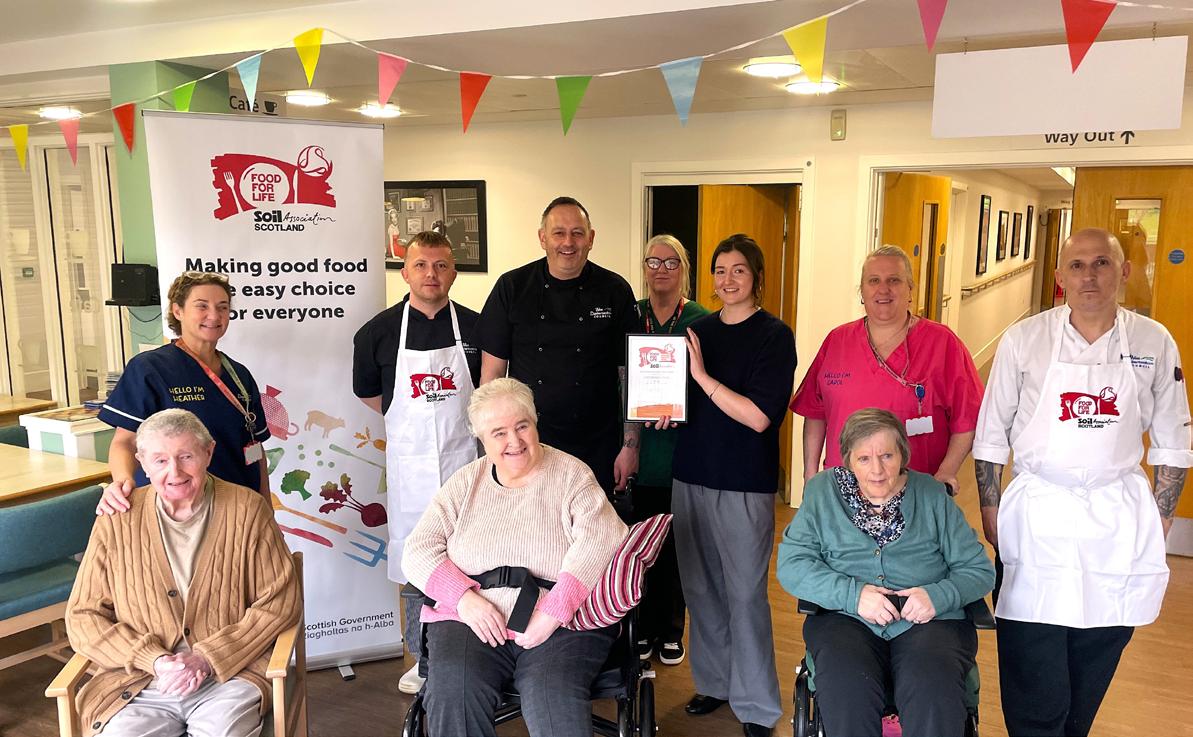
developing shorter, fairer supply chains, empowering caterers to create a series of innovative savoury and sweet recipes, delivering educational activities for pupils to become familiar with the pea’s journey from farm to school plate and utilising public procurement to support local business and increase the quantity of organic produce. Similarly, our pilot with Argyll and Bute Council and Wild Jura engaged pupils to try new, nutritious, local dishes by asking them to vote on their favourite dishes, while also achieving sustainability goals by developing a new, impressively short supply chain (less than an hour from source to school) and offering minimally processed, sustainable wild venison. The pilot also redirects catering budgets back into the local economy.

The contribution from Soil Association Scotland has been a best in practice approach to supporting a client’s goals. We have benefitted from advice, guidance, training, communication and engagement, cost mitigation, menu design and a sharing of best practice that has made a mark across all our front-line catering teams and allowed us to improve our service delivery of over 38,000 meals every school day.
Stephen Sawers, Head of Catering and Facilities Management, Glasgow City Council



Leading the Good Food Movement
Food for Life continues to move from strength to strength, with new developments to the Food for Life Served Here (FFLSH) and FFL standards introduced this year to ensure schools and caterers remain at the forefront of sustainable, healthy food.
Our FFL Schools programme currently reaches over 250,000 children across the UK, embedding the whole school approach in 598 education settings. Our whole school approach encompasses healthy food provision, food education and growing, as well as engagement with the broader school community. Pupils in FFL schools are twice as likely to eat their five a day and 40% more likely to report that they 'like' or 'really like' school meals. These benefits extend beyond the school gate – 45% of parents report eating more veg when their child attends a FFL school. FFL delivers a particularly important service in deprived areas, which are often geographical ‘food deserts’ where healthy, fresh, sustainable food is simply not accessible. From 2024-25, in Lancashire, almost half of the 115 primary schools and early years settings enrolled in the FFL programme were located in some of the 30% most deprived areas of England. Across the Lancashire programme, around 14,000 children benefited from improved
food education and 184 teaching staff attended in-person training days. In a follow-up survey in two enrolled schools, we found that school meal uptake was 8% higher, and that those eating school meals consumed nearly 20% fewer ultraprocessed foods (UPFs).
This year, we also launched the Food for Life Nourishing Communities Award, celebrating community organisations for making good food accessible in their area. We are delighted that the Star Light Multi Care community group in Walsall were the first organisation to gain this award in March 2025. Star Light Multi Care creates sensory safe spaces for children, runs cooking and growing activities, distributes surplus food around the community, and runs holiday and play
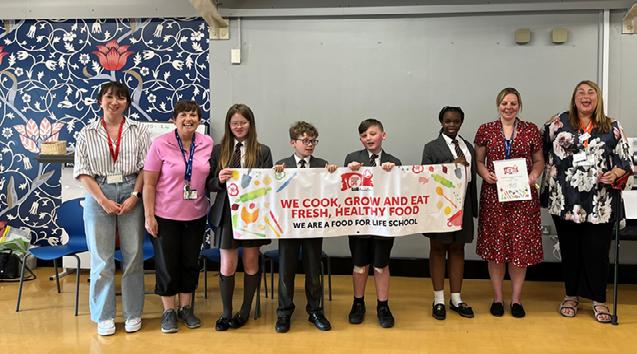
Pictures: Pupils with FFL award / Kingfisher School, Pupils growing / Alfreton Park School
We have commissioned Food for Life because it offers an evidence-based, empowering programme of support which we can target in our efforts to tackle health inequalities across our diverse county.
Lucy O'Loughlin, Public Health Specialist, Devon County Council


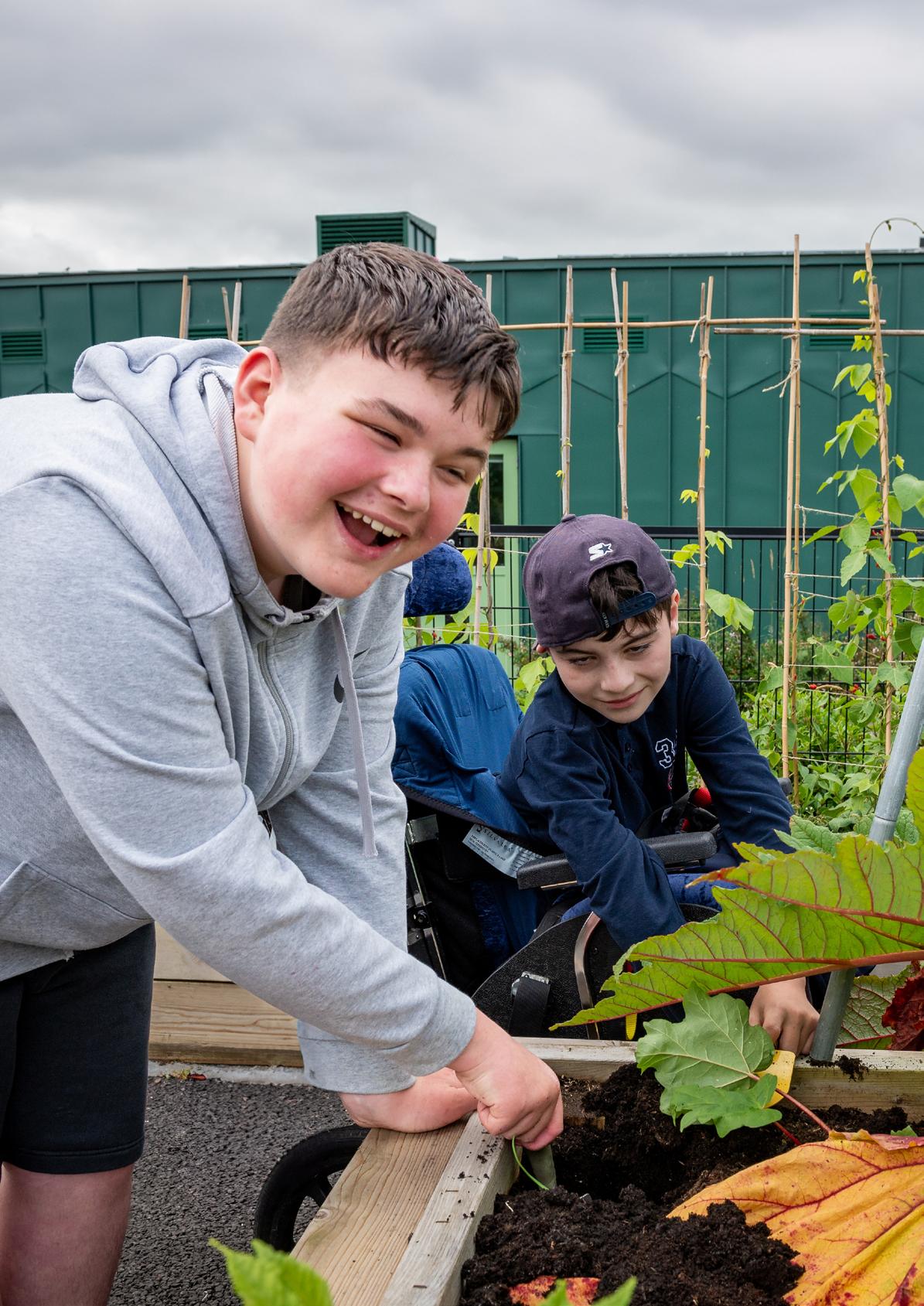


Policy & Influencing
One of the Soil Association’s greatest strengths is our ability to gather detailed, current information from those on the front lines of food and farming and relay their experiences to inform policy at the highest level.
From June 2024-25, our team held over 560 external meetings, including over 145 meetings with policymakers across the UK, Scottish and Welsh governments. We were delighted to be recognised, alongside Sustain, in the 2024-25 Food Issues Census as a top collaborator in the environmental and food sector. Over the course of the Regeneration Fund, our driven Policy Team has focused on three key levers to achieve change:
• Gathering and publishing evidence to identify solutions to restore our broken food system
• Collaborating with other NGOs for a shared voice on key food and farming issues
• Influencing change by building strong relationships across Government to impact policy.
We continue to push for an English Organic Action Plan (OAP) with a 10% land-share target, including through a December 2024 policy briefing and an open letter signed by Greenpeace, RSPB and others. Through our work co-chairing the English Organic Forum (EOF), we continue to advocate for targeted support for organic farmers, liaising closely with Defra’s Organic Unit.
The EOF has developed a draft organic action plan, which was presented this to Defra, and has also submitted various evidence and policy papers, most recently in July for the Farm Profitability Review. In Scotland, an OAP is due to be launched this Autumn and follows extensive lobbying and engagement by SA Scotland and close co-ordination with MSPs, policymakers and external stakeholders. Our advocacy also contributed to the protection of the budget for organic conversion and maintenance payments and restoration of £20 million to the agriculture budget in 2025/26.
Our Policy team has led the charge on ultra processed foods (UPFs) for several years, building understanding in both policy and public spheres, contributing evidence to high level political enquiries, collaborating with scientists, briefing senior government officials, and developing practical solutions. From being a little-understood, fringe issue, UPFs are now firmly in the spotlight, with 77% of the public concerned about UPFs (FSA, 2024). Our recent ‘Tell the Whole Truth’ campaign gathered evidence of industry lobbying of the government; we made the front page of The Guardian and shared a report and petition (19,847 signatures by July 2025). Our report includes asks to:
- expand eligibility for free school meals. We are delighted that this has since been put in place.
- introduce mandatory business reporting on minimally- versus ultra-processed food sales. Following our 2024 Out to Lunch campaign, seven high-street restaurant chains pledged to report on the proportion of their ingredients and products that are UPFs - the first time any UK business has done so.
As convenors of a cross-NGO working group, we pressed for mandatory, highwelfare, organic-inclusive Government Buying Standards. The Soil Association also facilitated a pivotal workshop with LEAF and Defra in April 2025, building confidence in the feasibility of a 20% organic procurement target in public food sourcing. We have also recently taken senior Government officials to visit Food for Life schools and hospitals and been invited by the Department for Education and Department of Health to join the official advisory board overseeing updates to the School Food Standards.
Excess nitrogen use contributes towards pollution, global warming, and significant biodiversity loss, particularly in waterways. We convene the Sustainable Nitrogen Alliance (SNA), which produced a Nitrogen Balance Sheet to track the massive nitrogen losses to the environment through intensive livestock and arable systems. In December 2024, we hosted a parliamentary event with Peers for the Planet to share our commissioned research on the gap between nitrogen policy and statutory targets, and communicate solutions. Following this, the Environment and Climate Change Committee in the House of Lords announced an inquiry into nitrogen use. SNA members contributed evidence detailing how the nitrogen lost to the environment through wasted artificial fertiliser and livestock manure currently costs British farmers more than the
government’s annual farming budget. The report from this inquiry, released in July 2025, closely mirrors our evidence and asks; it recognises the devastating and wide-ranging effects of nitrogen pollution and highlights how, in England, successive governments have failed to tackle this, largely due to ineffective and siloed working. The report, echoing the SNA, is calling on Government to produce a holistic nitrogen strategy within two years.
We also launched the Stop Killing Our Rivers campaign in March 2024, comprising a report, a media campaign reaching 177.2m people, a campaign video championing citizen voices, and a petition, which achieved over 30,000 signatures and over 3,000 letters to MPs. Our campaign centred on three key asks to government to place a UK-wide ban on new intensive poultry units (IPUs), to support a just transition for farmers, and to take action to reduce chicken consumption. A key campaign result was a parliamentary question from Kerry McCarthy MP, which prompted a direct response from the UK government. We continue to build on this campaign, for instance, we co-hosted panels at the Labour and Conservative party conferences in September 2024 to advocate for the Water Bill to address sources of water pollution beyond sewage.
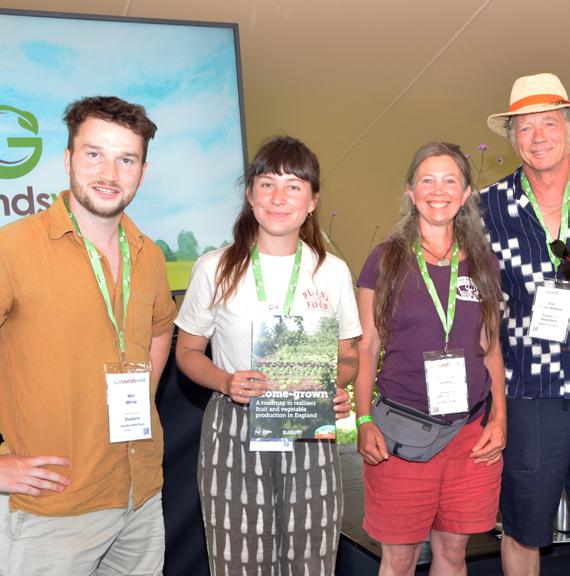




Royal Patron
His Majesty King Charles III
Board of Trustees
Martin Nye
Phil Fearnley
Andrew Burgess
Isabel Oliver
Jonathan Spencer MBE
Caroline Missen
Sabine Vandenbroucke
Dr. Tony Ballance
Lauren Branston
Richard Allan
Steven Lizars

Cover picture: Apple tree
Eastbrook Farm
Alexander Burton
